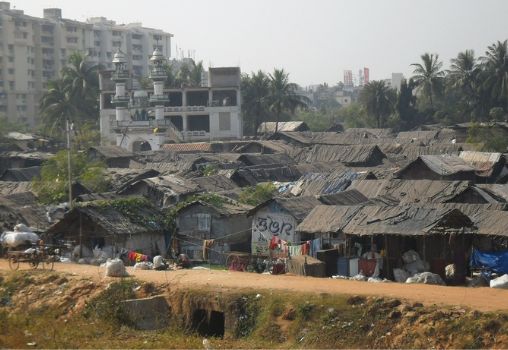This event report is based on a webcast discussion on “Social Dimensions of Resilience: Challenges of Inner-city Redevelopment, Impact, and the Way Forward” by Prof. Souvanic Roy. The event is organized by the Center for Habitat, Urban and Regional Studies (CHURS) at IMPRI Impact and Policy Research Institute, New Delhi.
The distinguished panelists include Speaker: Prof Souvanic Roy, Professor, Department of Architecture, Town and Regional Planning; Founder-Director, School of Ecology, Infrastructure and Human Settlement Management, Indian Institute of Engineering Science and Technology (IIEST), Shibpur, West Bengal.
Chair: Dr. Rumi Aijaz, Senior Fellow, and Head, Urban Policy Research Initiative, Observer Research Foundation (ORF), New Delhi.
Discussants: Prof Shipra Maitra, Professor, Institute for Human Development, New Delhi. Dr. Ashima Sood, Associate Professor, Anant National University, Ahmedabad. Prof Tathagata Chatterji, Professor (Urban Management & Governance), School of Human Settlements, and Coordinator, Centre for Humanities and Compassion Studies, XIM University, Bhubaneswar. Tikender Singh Panwar, Former Deputy Mayor, Shimla; Visiting Senior Fellow, IMPRI, New Delhi.
The segment began with Prof Roy presenting on the topic of ‘Social Dimensions of Resilience: Challenges of Inner-city Redevelopment, Impacts, and the Way Forward, where he very aptly mentioned some of the most important problems that the Indian cities are experiencing.
The current approaches taken by the city and state governments are leading to further inequalities for the selective social class inhabiting the cities. Based on the current scenario, rich and middle-income classes of household’s needs are prioritized over the needs of the poor and marginalized.
The process of gentrification and displacement of the marginalized population was also a big area of focus in the presentation. He also discussed two prominent cities where production spaces were transformed into consumption spaces.
With that, some of the challenges were discussed on how the re-building of cities can bring about a change in the transactional value of the land. Which may further disrupt the social resilience factors required for sustainable and harmonious living.
He described the city rejuvenation process as urban regeneration and gave major examples such as Paris in France, which last took place in 2020.
He also shared the example of Utrecht in Holland where large-scale redevelopment took place in the post-war era to rebuild their city. Therefore, not only the social composition of the place changes but also the physical component of the space.
“Indian cities tend to be over-planned, over-regulated, and under-governed.”– Prof. Souvanic Roy
Gentrification
Dr. Sood delved into the concept of gentrification which occurs during inner-city development. During such a process, it displaces a huge section of the population to the peripheries of the city.
The peripheral area of the city usually falls under the non-municipal governing areas. And unplanned development takes place. As a result, it also raises governance issues that require additional action and attention.
Urban Renewal And Its Social Implications
Agreeing and converging with Dr. Roy’s views, Prof. Chatterjee began by discussing the topic of urban renewal and its associated social issues. One major topic of concern that was discussed was gentrification, and how it enabled the creation of an informal sector in the newly renewed city projects.
As the character of the political state changes, it is expected that a strong dependence takes place between the political society and the informal sector. This patron-client relationship between the two and the regime characteristics influences a lot on how the urban renewal process pan out.
Active Participation By People At The Local Level
Mr. Panwar highlighted the priorities and some very relevant points, such as the priorities of the government, as inadequate attention is being paid to the weaker sections of society. He vouched for local-level planning models and the building up additional layers upon that.
The planning process should be more democratized so that people as stakeholders have a say in their immediate society. Hence, active participation of the people is required to address the current challenges that lie ahead of us.
“The more a city attracts investments, the more the population migration follows.”- Tikender Panwar
Social Resilience
Dr. Shipra Maitra shared her subtle view that we might not be overplanning but in fact, under-planning such that it creates a deficiency in our minimum planning standards. The city planners focus on the physical factors with regards to sustainability but ignore the social sustainability and social resilience factors.
Dr. Shipra Maitra emphasized the importance of social interaction and how participation should be linked to the physical components.
Increasing people interaction and participation aids in building a more sustainable social atmosphere. Local-level development leads to regional development, which then becomes a city development.
Hence, local-level planning should be an integral part of having prosperous and vibrant cities. She also advocated large-scale public-rental housing, to make metropolitan cities more sustainable and livable.
Land: A Scarce And Restricted Resource
Urban land is restricted, urban land is limited. Private land ownership makes things very difficult to accommodate the social issues in order to make land more inclusive.
The price of land is projected to rise due to constricted supply of land in the urban areas. This allows it to be a rare commodity and restricts access to others.
Closing Remarks
After thanking all the other panelists put forth their remarks, Dr. Rumi Aijaz invites Prof Roy to put forth his closing remarks. While presenting his final thoughts, Prof Roy added the importance of accounting for factors such as density, mobility, and accessibility while planning for affordable housing in mega-cities.
He also acknowledged and thanked all the other panelists for sharing their points. Moderator Dr. Aijaz emphasized the inclusive work that is necessary to improve the current process. Lastly, Dr. Arjun Kumar put forth his final thoughts and thanked the attendees upon which the webinar was concluded.
__
Acknowledgment: Dhimaan Sarkaar is a Research intern at IMPRI.
Written by Ishika Chaudhary
